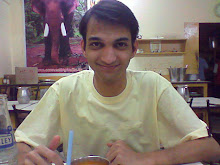The Indian electorate and their political representatives have not learnt their lessons after sixty years of Independence. Now that the election jaggaurnaut has started rolling, it is really comical to see Netas being 'exported' from some region of the country to represent people in another region.
What is the logic of one Sanjay Dutt from Mumbai fighting elections in Lucknow to represent it in Delhi? And one Azharrudin from Hyderabad to fight elections in Rajasthan? Is it not a joke of democracy?
How aware is Mr. Dutt of the problems in Lucknow? Lucknow is literally an extended arm in the busy air route from Mumabi to Delhi which Mr. Dutt shall frequent. With all due respect to him, he must look forward to contest from a constituency where he is known for what he has done - Bombay. Public servce is best done after one is aware of the social problems first hand. And for that one must have roots in that particular place and society. Mr. Dutt do you belong to our society? Most of the electorate you wish to represent in the hallowed Parlaiment house will never have seen you personally other than the movies you acted in. Very few of them can afford the parties you go to and most of them are contented to lead a simple life. Learn something from your father who contested from Bombay the place where he built his career and represented the people whose day to day problems he was aware of. It shall do a world of good to this democratic drama that the nation is about to go through in a month's time. Or else its just a joke.
And do the citizens have any right in deciding who shall stand in elections for them? How did the Samajwadi Party boil down on Sanjay Dutt? Did they ask the people of Lucknow before doing that? Will the Congress party ask the constituency in Rajasthan whether they agree to their choice of Azharruddin as their candidate? Lot of hue and cry is being raised over the inclusion of 'none of the above' in electronic voting machine in this election. However if looked at an economic point of view its a sheer waste of resources and time if at the end of all this activites one lands up with no result. This can be avoided if quality control is done right from the beginning and public opinion about their prefered representatives from every party is listened to .
The silver lining in all this is the example of Ms Mallika Sarabhai, the famous danseuse and social activist. She is contesting from Gandhinagar constituency the place she was born, the place that she describes as 'karmabhoomi'. She is part of the people residing there breathing the same air they breathe and facing the same challenges they face, no more and no less. That is an example of principled politics. That is an example one must look up to. That is an example both the electorate and the political parties must derive lessons from. Mindless fielding of candidates shall do no good to the nation for the ultimate goal is standing up for the people in the Parlaiment which can be only accomplished if one is more aware of the problems of the people than preferences of one's parties.
Its time we make our People Representation Act more specific and go beyond the usual criminlaization of politics. Till then its a wait and watch policy on the game plan of these exported netas. Amen!
